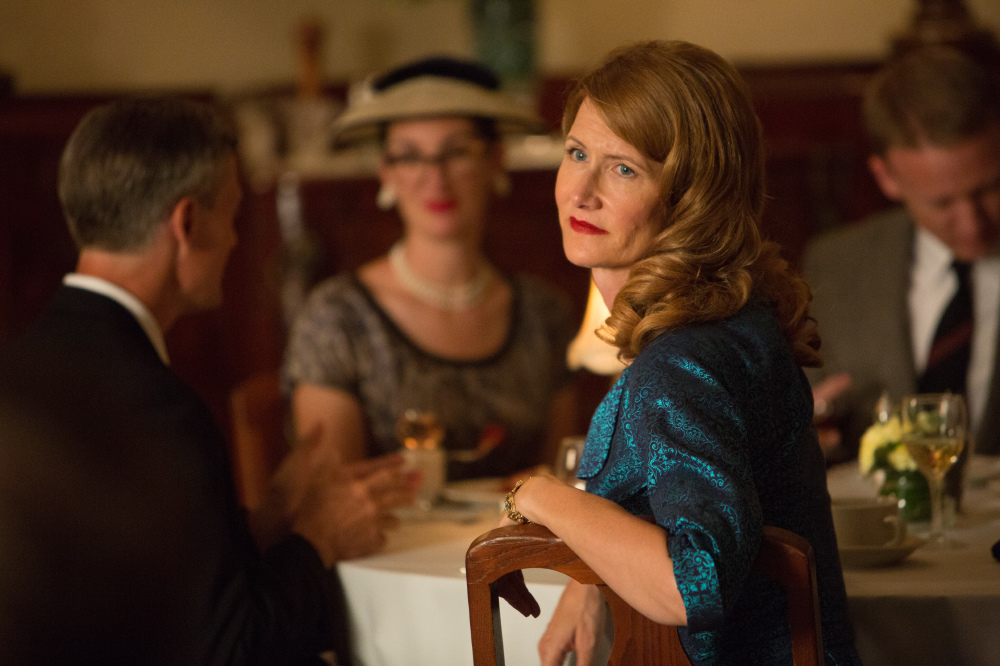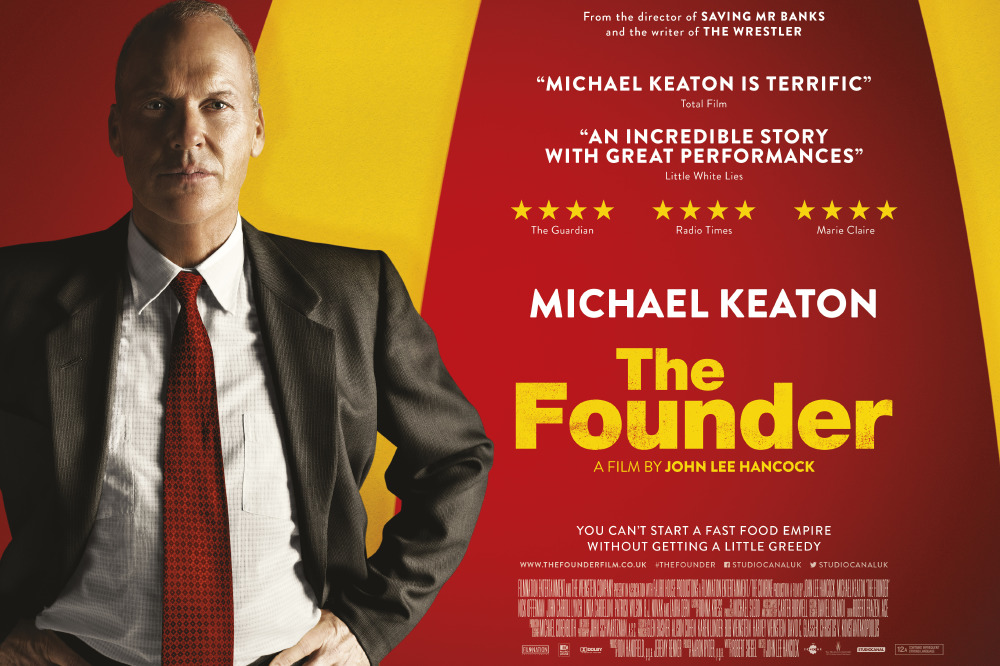In The Founder, Laura Dern stars as Ethel Kroc, the wife of Ray Kroc – a traveling salesman from Illinois who transformed a successful restaurant run by brothers Mac and Dick McDonald (John Carroll Lynch and Nick Offerman) into the McDonalds we now know today. Based on a true story, the film, directed by John Lee Hancock (Saving Mr. Banks), follows the trail of how Kroc, impressed by the McDonald brothers’ innovative assembly-line approach to the kitchen, maneuvered himself into a position where he was ultimately able to take control of the company, transforming himself in the process from failure to ‘founder’ of an economic empire.

Laura Dern in The Founder
The daughter of Bruce Dern and Diane Ladd, Laura Dern has been an industry presence since the early 80s whose work includes Mask, Smooth Talk, Blue Velvet, Wild at Heart, Rambling Rose, Afterburn, Jurassic Park, Citizen Ruth, October Sky, I Am Sam, We Don’t Live Here Anymore, Inland Empire, Recount, Enlightened, The Master, The Fault in Our Stars, 99 Homes and Wild. So too is 2017 shaping up to be another promising year for the Golden-Globe-winning and Oscar-nominated actress. In addition to her work in The Founder, Dern will be featured in Star Wars: Episode VIII, Fox Searchlight’s Wilson, HBO’s Big Little Lies and reunited with David Lynch on the new Twin Peaks.
We spoke with Dern about the making of The Founder in Los Angeles…
What initially attracted you to The Founder?
John Lee Hancock and I did the film, A Perfect World, which he wrote in the early 90s. It was his first screenplay. I loved him then. I loved his writing. And we always talked about working together one day. So to work with him now as a filmmaker was exciting… And I also love Michael Keaton - he’s such a brilliant actor. Of course, the not so subversive rather direct undercurrent to the film also excited me. The obvious question: Can capitalism and compassion coexist? And is there a model for that anywhere? The reflection on what it means to have no empathy and step on anyone to become the king is a really profound theme here. So that really excited me as well.
How much did you know about McDonald’s origins?
Really nothing. I knew there was this guy, Ray Kroc, but I never knew about the McDonald brothers. What I did know what that McDonalds was responsible for using filler, as the film addresses, with the milkshakes. And then there’s even a comment made within the film: ‘What next - we’ll be putting sawdust in our hamburgers?’ So they were notorious for kind of inventing and saving money by using fillers in various products. And the tie in, as is expressed in Fast Food Nation so brilliantly, between McDonalds and obesity in America or the question of poor health is something we’ve heard a lot about. But I didn’t know the story of these scientifically brilliant men who actually mapped it all out and created this new model. And that all those ideas that everyone else has used came from those two brothers. Using paper instead of plates, getting [your food] in 30 seconds and how to create that… It’s extraordinary.
What did you learn about Ethel Kroc as you researched her? Did you have many resources to draw from?
Not as much as one would like, partially I think because she was sort of thrown away. What I was given is what you see in the movie… It was a very long marriage. She was a younger woman that was starry-eyed and he was a dreamer, a young entrepreneur who was going to sell these cool things and they were going to have a great life together… [But] there was a lot of drinking and living with the ups and downs of “I’ve got another great idea,” which time and again didn’t work out.
What’s your take on Ray Kroc? His behavior, as depicted on screen, is reprehensible yet there’s something endearing about him as well.
It’s weird. I’ve got to say, to me that’s the beauty of Michael Keaton, the filmmaking and the script. What he [Kroc] did was so reprehensible… You know that’s a ruthless capitalist. But his ambition, his drive and most importantly his persistence… I just watched La La Land, about a girl who has twelve too many auditions and says “Forget it, I can’t take another heartbreak. I’m going to pack it up and go home.” But Ray keeps going for, what is it, thirty years of ‘no’s’? Doors slammed in his face. That takes something… That’s incredible. Most people have so much shame they wouldn’t consider going back to the same bank who had rejected them. But he keeps on going. So that is commendable for sure.
What was it like working with Michael Keaton?
Incredible. He’s brilliant about material. He really has a sense of what’s working and not working. He’s really open to other actors’ ideas - really open and supportive of how to make a very meticulous matter of a few scenes tell a story, which is difficult. Certainly within our relationship on screen. He loves his crews and he really loves to take in what everybody else’s art is, which is really cool. He’s also so funny, and his wit is so fast. I mean, he’s just on top of it.
And your director, John Lee Hancock? You’d previously starred in a film he’d scripted (A Perfect World; directed by Clint Eastwood). What was it like finally getting to work with him as a director?
The best thing about it was discovering that he’s as nice and lovely running the show as he was as a young writer going, “I can’t believe they’re making my movie.” Nothing has changed with his success and power on a set. And that was really beautiful to witness. I also got to work with his frequent collaborators – Michael Corenblith, the production designer, John Schwartzman our DP, Daniel Orlandi, who did the most beautiful costumes. You know, they did Saving Mr. Banks together and they’re an incredible team.
Do you see a similarity between Saving Mr. Banks and The Founder with both films focusing on two icons of Americana?
I think there’s perhaps a more obvious darkness in our tale. I mean you wouldn’t automatically compare Disney and Trump, but you sure would Trump and Ray Kroc, as every journalist I’ve talked to has... But the era, the ambition – those things, for sure, have similarities.
What was the biggest challenge making the film? You shot in Atlanta, right?
Yes. Other than the heat (laughs)… You know, for me it was mostly how to tell a story in a very short time and how to serve the film versus just the character. The only reason for [my] character from a dramatic standpoint is to see what [Kroc] was before and how the people who stood by him for years could be thrown away very quickly. I think my character foreshadows what eventually happens to the McDonald brothers. But you have to make that human and real and you also tell the story – Ethel and Ray’s story – of a love lost… And how do you tell that in a just a few scenes?
How faithful is the film to the actual events which took place?
I’m probably not the best person to ask because there’s so much I wasn’t privy to. But my understanding is that it’s incredibly accurate. To the point that the production designer was so feverish – Michael is so meticulous and brilliant that he spent, I’m told, weeks, recooking over and over again the perfect burger so that it would look exactly like the original McDonalds hamburger… I mean they wanted it to be exact.
Has the experience changed your view of McDonalds itself?
It’s enhanced my view. I don’t go and I won’t be going now. I know some of the other actors are now craving a Big Mac after seeing the movie. But, you know, I raise my kids on… Trying to honor local food. Trying to honor local growers. Trying to honor food that doesn’t have chemicals in it…
This is an amazing year coming up for you. We’ll be seeing you in Star Wars, reuniting with David Lynch for Twin Peaks, the HBO series Big Little Lies…
Which we’ve finished. And then I’m really excited about a movie I did last year called Wilson, a Fox Searchlight movie with Woody Harrelson that’s coming out, that I love. I’m so excited about that too. So it’s been an amazing year of work last year. Of working with the people I love and playing very different and very interesting characters.
What’s been your greatest takeaway from The Founder?
Working with incredibly nice people. That’s my fondest memory. It’s very rare to work with a group of people where just you walk on the set and everybody is the nicest person ever. Everybody has their heart and soul in the project. Everybody wants it to work for everybody else. It’s an incredible team. And if the movie business is part of a capitalist culture, then I would say there is a place for capitalism and compassion (laughs)… It was a beautiful thing to be part of.

The Founder is out in UK cinemas 17th February. Read the official synopsis for the movie below:
“Directed by John Lee Hancock (Saving Mr. Banks, The Blind Side) and starring Academy-Award nominated Michael Keaton (Birdman, Spotlight), Nick Offerman (Fargo, Welcome to Happiness, 21 Jump Street), John Carroll Lynch (The Invitation, Ted 2), Linda Cardellini (Mad Men), B.J Novak (Inglourious Basterds) and Laura Dern (99 Homes, Jurassic Park), THE FOUNDER is released in UK cinemas 17 February. The Founder is a drama that tells the true story of how Ray Kroc (Keaton), a salesman from Illinois, met Mac and Dick McDonald, who were running a burger operation in 1950s Southern California. Kroc was impressed by the brothers’ speedy system of making thefood and saw franchise potential. He maneuvered himself into a position to be able to pull the company from the brothers and create a billion-dollar empire.”

